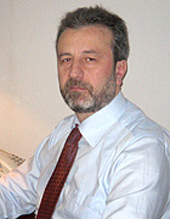Expert: “Russia chose the way of isolation”
By Temuri Kiguradze
Tuesday, February 3

Gogolashvili has told our newspaper that immediately after the fall of the Soviet Union relations between Russia and the EU were quite good. Several agreements on cooperation were signed between them. Under those documents Russia undertook to follow the path of democratic development, including abiding by common European standards in the economy and trade.
In this first period the expert notes that “In terms of democratic processes the EU didn’t have many objections to Russia, despite several developments which might have caused concern. The most important of these was the first Chechen War in 1995, which was strongly condemned by most of European society. I consider this reaction was one of the reasons Russia stopped its military actions and froze the conflict in Chechnya. European countries tried and succeeded in stopping Russia from turning this war into the kind of the bloodshed later caused by Putin during the second Chechen campaign.”
However Kakha Gogolashvili states that the situation changed after Vladimir Putin became the leader of Russia. “The EU tried to involve Russia in the Eurointegration process, offering cooperation in economic, political, cultural and technical spheres, however, overall these attempts were not successful,” the expert stated, adding that after Putin’s election the Kremlin “chose the policy of the isolation, and seems more and more to be going back to Soviet times.” Among the projects declined by the new Russian authorities Gogolashvili highlights their refusal to ratify the European Energy Chart, which would have given countries the possibility of accessing energy resources on a free market model. “If Russia had been a participant in the chart, it would not now have the possibility of dictating oil and gas prices in the South Caucasus and other regions, for example,” the expert states.
Commenting on recent events in Georgia, the expert considers that the EU “did its best” during the Russian-Georgian conflict. He supposes that “there certainly was a debate over the international structure which would be used to stop the August war” and the fact that the choice was the EU is very positive for Georgia. “We’re lucky that the EU and France, as the leader of the organization, mediated the conflict. The EU is an organization with a flexible position; it is able to make compromises. If, for example, the USA had been chosen instead of France, the result could have been totally unpredictable, as the US is not used to drawing back,” Gogolashvili says. However he adds that in the second round of the ceasefire negotiations the EU itself “made a step back” by not insisting on the withdrawal of Russian troops from the breakaway regions of Abkhazia and South Ossetia as required by the original August 12 Sarkozy-Medvedev agreement. “The EU was hurrying to make Russia withdraw its soldiers from the so-called buffer zones and was probably afraid of the humanitarian catastrophe Georgia could have faced if they had stayed, preventing transit through the country. Their presence was a sort of blackmail by the Russian side and the EU had to compromise on that,” he adds.
Subsequent developments have shown that the EU has not changed its position on Georgia, says the expert, referring to the Parliamentary Assembly of the European Council (PACE) session in January 2009 which adopted a resolution condemning Russia’s position on Georgia and calling on Moscow to withdraw its troops from the occupied territories and disavow its decision to recognise Abkhazia and South Ossetia. “This resolution was adopted with 147 votes for to 21 against. The Russian PACE delegation has 18 members, meaning that only 3 members of European delegations shared Russia’s position. Russia has become isolated again,” said the EU expert.
“The role of the EU in the Caucasus will rise in future. The [August] conflict has acted as a catalyst which will lead to the activation of European institutes in the region. It’s quite early to talk about the concrete results this activation might bring, but it should serve to establish peace, solve the conflicts, create a stable situation and I think finally create an agreement acceptable for all the parties active in this [South Caucasus] region,” concluded Gogolashvili, who spoke to The Messenger on January 30.
